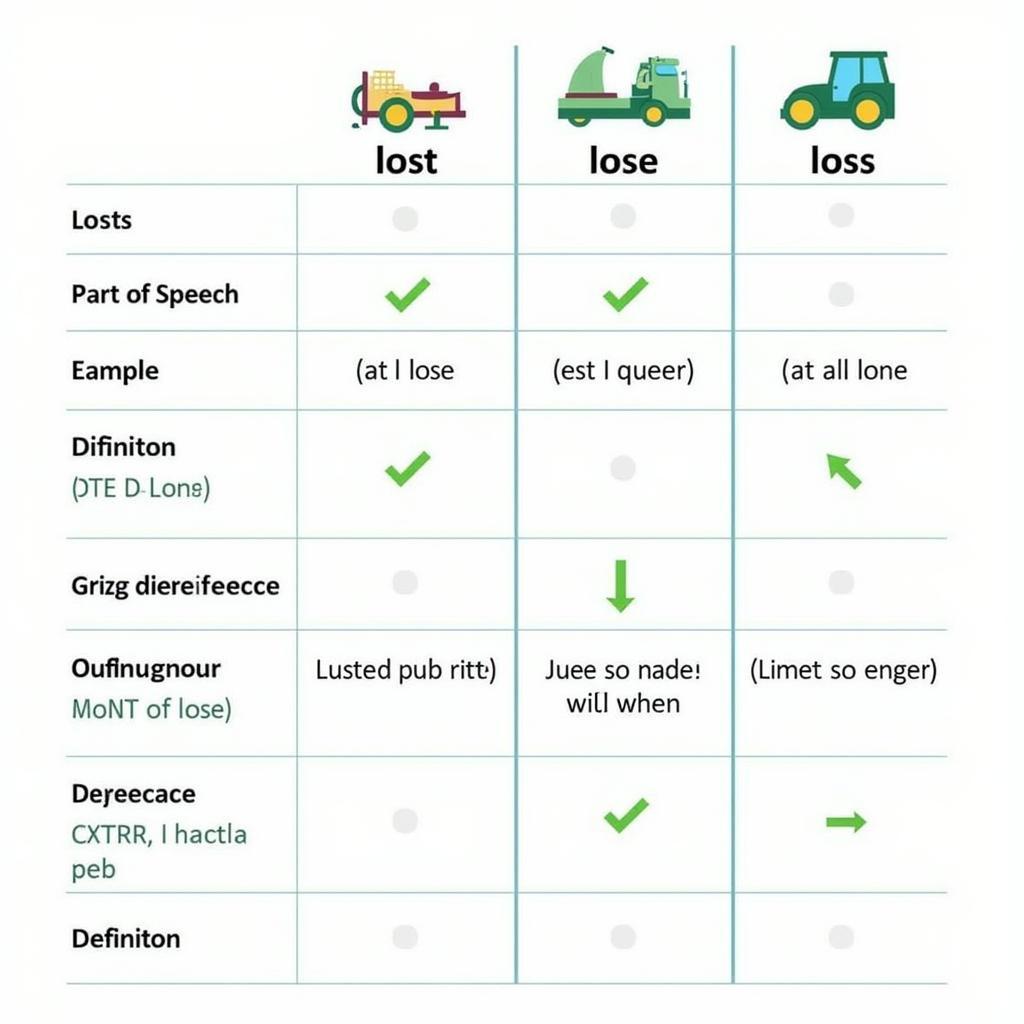Lost, lose, and loss – three words that often trip up even seasoned English speakers. Understanding the difference between these words is crucial for clear and effective communication. This article will delve into the nuances of lost vs. lose vs. loss, providing you with the knowledge to use them correctly.
 So sánh giữa Lost, Lose và Loss
So sánh giữa Lost, Lose và Loss
When to Use “Lost”
“Lost” is the past tense and past participle of the verb “lose.” It describes something that has already happened. It’s used as an adjective to describe something that is no longer possessed.
- I lost my keys yesterday.
- The team has lost their last three games.
- The lost city of Atlantis remains a mystery.
Decoding “Lose”
“Lose” is the base form of the verb and describes the action of ceasing to have something. It is used in the present tense and with future tenses when describing a potential loss.
- Don’t lose your ticket.
- They might lose the match if they don’t improve their game.
- I hate to lose at anything.
Understanding “Loss”
“Loss” is a noun that refers to the state of no longer having something. It represents the thing or person that has been lost.
- The loss of his job was devastating.
- They suffered a great loss when their pet died.
- The company reported a significant loss in revenue.
Lost vs. Lose vs. Loss: A Practical Guide
Understanding the grammatical function of each word is key to using them correctly. Think of it this way:
- Lose (verb): The action of losing.
- Lost (adjective/verb): Something that has been lost (past tense of “lose”).
- Loss (noun): The state of having lost something.
Lost vs Lose vs Loss: Common Mistakes to Avoid
One common error is using “lost” instead of “lose” in the present tense. For instance, saying “I lost my temper easily” is incorrect. The correct phrase is “I lose my temper easily.” Similarly, using “loss” as a verb is also incorrect. You wouldn’t say “I loss my phone,” but rather “I lost my phone.”
When Loss Goes Beyond the Game
In the world of football, the concept of loss extends beyond the scoreboard. The loss of a key player due to injury can significantly impact a team’s performance. The loss of a beloved manager can leave a void in the club’s identity. Even the loss of a crucial match can have far-reaching consequences, affecting team morale and potentially jeopardizing their chances of winning the title. This emotional weight adds another layer of complexity to the word “loss” within a sporting context.
yoel romero vs luke rockhold full fight
Lost, Lose, or Loss: A Quick Recap
To summarize, remember these key distinctions: “lose” is the present tense verb, “lost” is the past tense and past participle of “lose”, and “loss” is the noun form. By keeping these differences in mind, you can effectively communicate your ideas with clarity and precision.
In conclusion, mastering the distinctions between lost, lose, and loss is essential for clear communication in English, especially when discussing the emotional highs and lows of football. Understanding these nuances will undoubtedly enhance your ability to express yourself accurately and effectively.
FAQ
- What is the difference between lost and lose?
- When do I use the word loss?
- Can you provide examples of lost, lose, and loss in a sentence?
- Is “loss” ever used as a verb?
- What are common mistakes when using these words?
- How does the context of football change the meaning of “loss”?
- What resources can I use to practice using these words correctly?
Khi cần hỗ trợ hãy liên hệ Số Điện Thoại: 02838172459, Email: truyenthongbongda@gmail.com Hoặc đến địa chỉ: 596 Đ. Hậu Giang, P.12, Quận 6, Hồ Chí Minh 70000, Việt Nam. Chúng tôi có đội ngũ chăm sóc khách hàng 24/7.